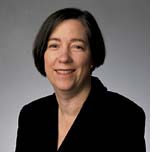 |

Friday Evening Lecture Series
 06/27/03 06/27/03
From Mad Cows to "Psi-chotic" Yeast: strange diseases and strange genetics
Susan L. Lindquist, Director, Whitehead Institute for Biomedical Research; Professor of Biology, Massachusetts Institute of Technology
Introduction by William T. Speck, Director and CEO, Marine Biological Laboratory
Lecture Abstract:
What do "mad cows," people with neurodegenerative diseases, and yeast cells growing happily on a deadly antibiotic have in common? They are all experiencing the consequences of misfolded proteins. Each organism has thousands of different proteins and they define its very nature. Proteins must fold into just the right shape to do their jobs. But like a piece of origami paper, they can take the right path and fold into a swan or take the wrong path and fold into a rapacious hawk. In humans the consequences can be deadly, leading to Alzheimer's disease and the human form of "mad-cow" disease. Remarkably, a very similar process has recently been discovered in yeast. Here it does no harm and can even give cells a new capacity to survive conditions that would otherwise kill them. Yeast cells provide a great opportunity to study this process because they are so cheap to grow and easy to manipulate. We are using them as a living "test tube" to study protein folding in a variety of neurodegenerative diseases, with the aim of providing new strategies for fighting disease and a much greater understanding of genetics.
Susan Lee Lindquist received her Ph.D. in Biology from Harvard University and her B.A. from the University of Illinois, and then served as a post-doctoral fellow at the University of Chicago where she rose from Assistant Professor to full Professor of Molecular Genetics and Cell Biology (1976 to 2001) and was also a Howard Hughes Investigator (1988 to 2001). She joined the Massachusetts Institute of Technology in 2001 as Professor of Biology and Director of the Whitehead Institute of Biomedical Research. Dr. Lindquist's honors are numerous. It is of special relevance to note that she gave the Keith Porter Lecture at the 2001 American Society for Cell Biology annual meeting, the Arthur M. Sackler Lecture at the National Academy of Sciences in 2002 and the Allan C. Wilson Memorial Lecture in 2002. She was elected to the National Academy of Sciences in 1997 and to the American Academy of Arts and Sciences in 1998. In 2000 she was awarded the Novartis Drew Award in Biomedical Research.
William T. Speck received his B.A. from Rutgers University and his M.D. from the Wake Forest University School of Medicine. After completing his residency and fellowship training at Columbia University, he obtained a joint appointment in the Departments of Pediatrics and Microbiology. After three years, Dr. Speck moved to the Department of Pediatrics at Case Western Reserve University, where he directed the Division of Infectious Diseases and house staff education and subsequently served as Professor and later Chairman and Director of the Department of Pediatrics. In addition, in 1982 he was appointed Chief Executive Officer of Rainbow Babies and Children’s Hospital, an appointment he held for ten years. In 1992 Dr. Speck moved to New York to become the President and CEO of the Presbyterian Hospital, a position he held until 1999, when the hospital merged with New York Hospital and its regional health care system, creating the largest academic health care delivery system in the United States. In August 2000, he joined the MBL as Interim Director and Chief Executive Officer. In 2001, Dr. Speck was appointed Director and Chief Executive Officer of the MBL. A pediatrician by training, Dr. Speck first came to the MBL in the 1970s to conduct research on the effects of drugs and environmental pollutants on developing embryos. He is a member of the MBL Corporation and has served on the Laboratory's Board of Trustees since 1994.
|